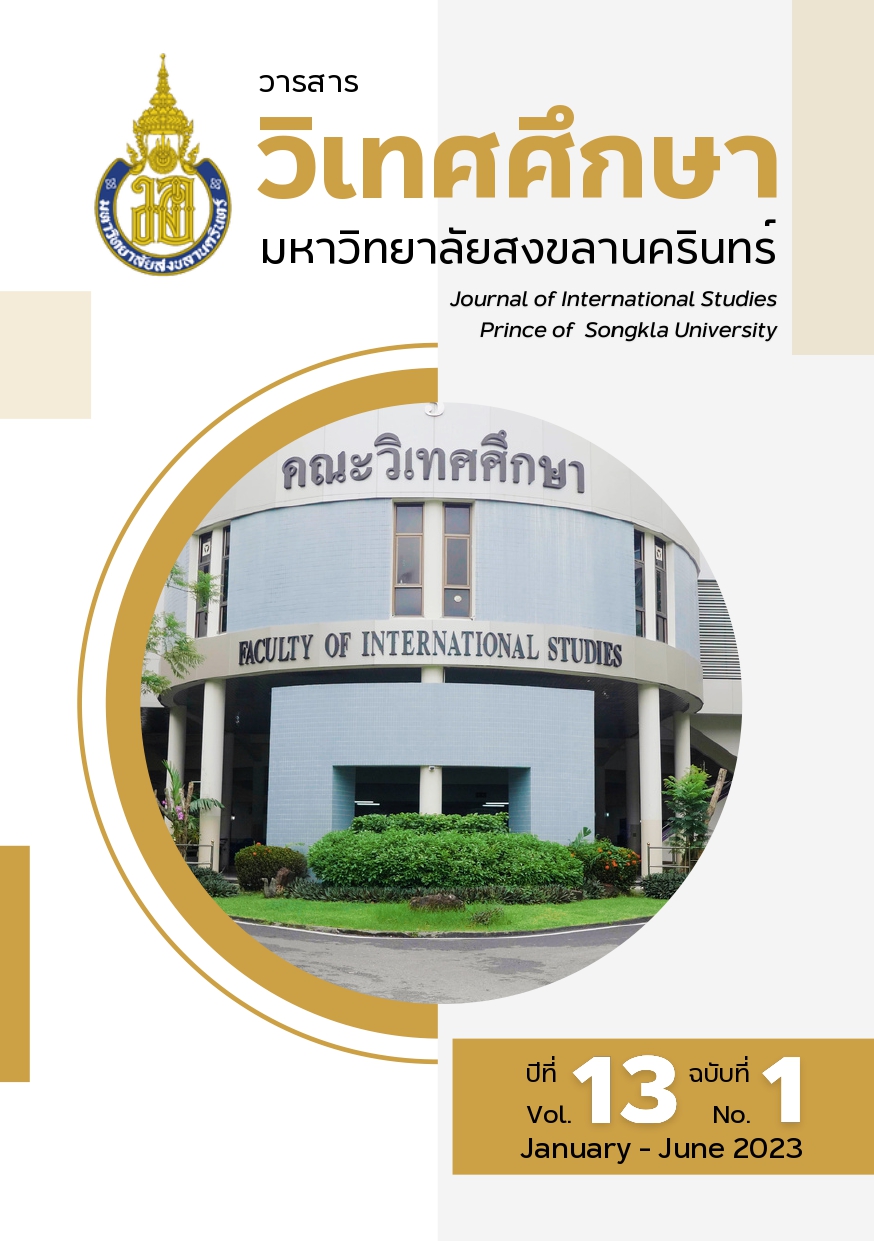Attitudes of Thai Netizens in Social Media Towards Thai Illegal Labors in South Korea During the COVID-19 Pandemic
Main Article Content
Abstract
As a result of the COVID-19 outbreak, South Korea has implemented regulations that allow overstaying residents and Thai illegal labors to return to their home country by offering blacklist exemptions without imposing penalties. Following the lenient controls, many Thai illegal labors desire to return home country. There was significant criticism on social media, as well as varied attitude regarding the immigrants. This study is an attempt to study the attitudes of Thai netizens towards Thai illegal labors in South Korea during the COVID-19 pandemic. The 100 comments about the news were collected from Facebook page ‘Rueng Lao Chao Ni’. The results revealed that there were various attitudes among Thai people including positive, negative, and neutral attitudes. The negative attitude is resulted from worries, anxiety due to the pandemic, the concern about the Thai government management and Thai illegal labors’ behavior, the irresponsibility, as well as bragging personality about the high income. Empathy and human equality were presented as positive attitude. However, some people have a neutral attitude toward Thai illegal labors returning to the home country.
Article Details

This work is licensed under a Creative Commons Attribution-NonCommercial-NoDerivatives 4.0 International License.
Statements and opinions expressed in articles herein are those of the authors and do not necessarily reflect the position of the editors or publisher.
Article, information, text, image, etc. which are published in Journal of International Studies, belong to Journal of International Studies. If anybody or any organization would like to use part or whole of them, they must receive written permission from Journal of International Studies before usage.
References
กรวินท์ กรประเสริฐวิทย์. (2557). ทัศนคติความรู้ ความเข้าใจ พฤติกรรม และ คุณลักษณะการใช้งานของเทคโนโลยี ที่มีอิทธิพลต่อการ ตัดสินใจในการใช้เครื่องชำระค่าโทรศัพท์อัตโนมัติ ของประชาชนในกรุงเทพมหานคร ปี 2558 [วิทยานิพนธ์ปริญญามหาบัณฑิต]. มหาวิทยาลัยกรุงเทพ. http://dspace.bu.ac.th/handle/123456789/1760
จิดาภา สดสี. (2557). สื่อสังคมออนไลน์ ความรับผิดชอบต่อสังคมของลูกค้าและคุณภาพบริการที่ส่งผลต่อการตัดสินใจใช้บริการคาเฟ่สำหรับคนรักแมวในเขตกรุงเทพมหานคร [วิทยานิพนธ์ปริญญา มหาบัณฑิต]. มหาวิทยาลัยกรุงเทพ. http://dspace.bu.ac.th/handle/123456789/1911
ไชยโรจน์ พิณทุกานนท์. (2559). ทัศนคติของผู้ประกอบการที่เคยเช่าพื้นที่ในตลาดนัดอาร์ท บ๊อก (Art Box Market) ในกรุงเทพมหานครและปริมณฑล [สารนิพนธ์ปริญญามหาบัณฑิต]. มหาวิทยาลัยมหิดล. https://archive.cm.mahidol.ac.th/handle/123456789/1872
ทิศนา แขมมณี. (2516). กระบวนการหาค่านิยมแท้. วารสารครุศาสตร์, 16(9). 40-45.
ราชบัณฑิตสถาน. (2524) พจนานุกรมศัพท์ สังคมวิทยา. กรุงเทพฯ: รุ่งศิลปการพิมพ์.
ฤทธิณัณฑ์ เชื้อทอง และ รุจิระ โรจนประภายนต์. (2559). ค่านิยม อุดมการณ์และรูปแบบการสื่อสารทแสดงถึงลักษณะทางวัฒนธรรมของคนไทย. วารสารนิด้าภาษาและการสื่อสาร มหาวิทยาลัยนิด้า, 21(29). 110-143. https://so04.tci-thaijo.org/index.php/NJLC/article/view/94424
ศิรศักย เทพจิต. (2563, 1 เมษายน). COVID-19 Pandemic: การตอบสนองเชิงนโยบายสาธารณะในการรับมือกับปัญหาพยศ. เศรษฐสาร. http://www.setthasarn.econ.tu.ac.th/blog/detail/59
ศุภรางศุ์ จันทร์เมฆา. (2559). ทัศนคติและความพึงพอใจต่อการประชาสัมพันธ์ผ่านสื่อสังคมออนไลน์ที่มีผลต่อ พฤติกรรมการเลือกแหล่งท่องเที่ยว [วิทยานิพนธ์ปริญญามหาบัณฑิต]. มหาวิทยาลัยกรุงเทพ. http://dspace.bu.ac.th/bitstream/123456789/2974/5/subharang_chun.pdf
สนิท สมัครการ. (2534). วัฒนาการทางวัฒนธรรมของสังคมไทย. กรุงเทพฯ : โอเดียนสโตร์.
สิทธินันต์ สันติกุลสุข และ พีรภาว์ ทวีสุข (2561). พฤติกรรมและทัศนคติของผู้บริโภคที่มีผลต่อการตัดสินใจซื้ออาหารกราโนล่าผ่านร้านค้าออนไลน์. วารสารเกษตรศาสตร์ธุรกิจประยุกต์, 12(16), 61-82. https://so04.tci-thaijo.org/index.php/KAB/article/download/120680/92107/313301
สิริภัทร์ โชติช่วง, นนทิภัค เพียรโรจน์, ณัฐมน ราชรักษ์, และ วีระศักดิ์ คงฤทธิ์. (2561). ทัศนคติด้าน 7 Greens ที่มีผลต่อการรับรู้ภาพลักษณ์ด้านการท่องเที่ยวของนักท่องเที่ยวในเกาะสมุย. วารสารบริหารธุรกิจ เศรษฐศาสตร์และการสื่อสาร, 13(1), 1-13.
https://so02.tci-thaijo.org/index.php/BECJournal/article/view/79367
______. (2562, 13 ธันวาคม). เกาหลีออกกฎใหม่เข้มแรงงานผิดกฎหมาย จับ-ปรับ- ห้ามเข้าประเทศ 10 ปี. Workpoint today. https://workpointtoday.com/korea/
______. (2563, 23 กุมภาพันธ์). เปิดลัทธิชินชอนจี กรณีศึกษาอาจุมม่า 31. Workpoint today. https://workpointtoday.com/shincheonji-south-korea-coronavirus/
สราวุธ ไพฑูรย์พงษ์. (2561, 31 สิงหาคม). แรงงานไทย ผิดกฎหมายในเกาหลี. มติชนออนไลน์. https://www.matichon.co.th/columnists/news_1108170


